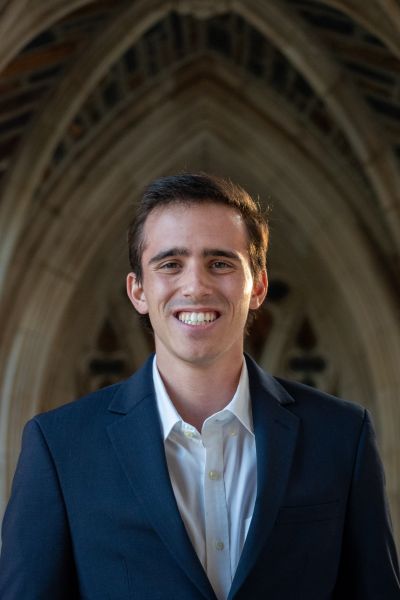by Mimi Jenness

This week's spotlight features Ben Yacht, a Neuroscience major from Plainview, NY. Yacht is part of the Neuroscience Ambassadors trio for the 2024–2025 academic year.
Yacht’s interest in the brain began during his junior year of high school when he took AP Psychology. The unit titled Biological Bases of Behavior, which explores how the brain influences behavior, left him excited to learn more. His fascination deepened further when he completed the Medical Neuroscience course on Coursera with Dr. Leonard White before his senior year, which broadened his understanding of the brain’s complexities. This growing passion led him to conduct research on Alzheimer’s disease during his senior year. By the end of high school, Yacht had solidified his decision to pursue a career dedicated to understanding the brain. He made a conscious effort to choose schools with strong undergraduate neuroscience programs, and Duke stood out.
At Duke, Yacht immersed himself in neuroscience-related activities even before officially declaring his major in the spring of his sophomore year. He joined the Cognitive Neuroscience and Law Focus Group during his first semester and started on foundational coursework, such as Neuroscience 101, the following spring. He continues to fill his schedule with neuroscience courses. Even when taking a semester abroad in Copenhagen, Yacht managed to squeeze in two neuroscience courses to help expand his knowledge in the field.
“For me, neuroscience is one of the most exciting and rapidly developing fields,” says Yacht. “We’ve only scratched the surface of understanding the brain, and that makes it an incredibly engaging field to study.”
Beyond lectures, Yacht is furthering his understanding of the brain by engaging in research. He is currently a member of the Translational Pain Research Lab in the Duke Department of Anesthesiology, where he works under Dr. Andrea Nackley. The lab's primary focus is understanding chronic primary pain conditions (CPPCs), specifically how the COMT gene mutation contributes to the onset of chronic pain in the peripheral nervous system. Yacht’s own research examines the role of microglial activation in central sensitization—a process that plays a critical role in maintaining chronic pain long after an initial injury. Yacht’s research is part of a larger effort to unravel the biological mechanisms that drive persistent pain, a condition that remains poorly understood. Through this hands-on research, Yacht has gained more experience in neuroscience, immunology, and pain management, skills he plans to apply in his future career. He is currently working on his thesis based on this research, which he will defend in Spring 2025. A successful defense will earn him the title of Graduating with Distinction (GwD) at the 2025 Commencement.
Yacht is proud to call Duke his alma mater, an institution that offers a unique blend of academic rigor and opportunities for personal growth. This is all started with a campus visit. Yacht recalls his tour on a rainy February day in 2020, where he saw firsthand how students balance academics with a fulfilling social life. From studying in the library to hanging out with friends in K-ville, Duke seemed like the perfect place to challenge himself academically while enjoying a well-rounded college experience. Because his campus tour had such an impact on him, he is now paying it forward by being the welcoming face that prospective students and families see when they arrive at Duke for their college tours. He shares insights into the university’s rich history and offers a glimpse of campus life. Taking it one step further, Yacht is dedicating his senior year to serving as a Neuroscience Ambassador, hoping to pass on the knowledge and tips he has accumulated over the last four years.
Understanding the challenges of transitioning into the neuroscience major, Yacht aims to make this process easier for current students by guiding them through course selection and major requirements. He hopes to be a resource for students navigating the complexities of the major, ensuring their experiences are as smooth and stress-free as possible. He views this role as an opportunity to advocate for neuroscience majors, ensuring their voices are heard and their concerns addressed—setting up the next generation of neuroscience majors for success after his graduation.
After graduation, Yacht plans to take a gap year while applying to medical school, with the long-term goal of becoming a neurologist. Combining his love for neuroscience with his desire to help others, Yacht is committed to a future where he can make a meaningful impact on patients suffering from neurological conditions. In addition to his professional aspirations, Yacht also envisions a balanced life, one that includes spending time with family and friends, traveling, and making lasting memories. He’s passionate about staying connected with others and is always open to meeting new people. “I love talking to people,” he adds. “Whether it’s about neuroscience or anything else related to Duke, I’m always happy to chat and help others however I can.”
You can reach Yacht at: Benjamin.yacht@duke.edu